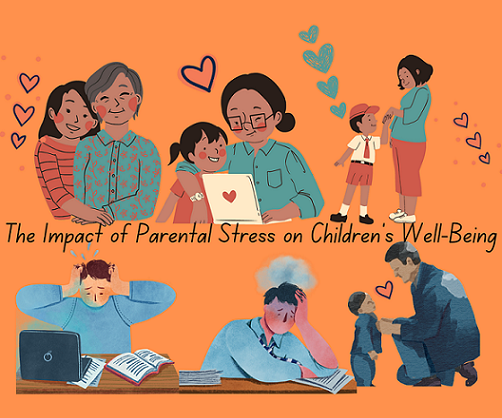Parenting is one of life’s most rewarding journeys, yet it’s also loaded with its fair share of challenges. For parents, navigating through the demands and pressures of raising children can sometimes lead to significant stress. However, what often goes unnoticed is the profound effect that parental stress can have on the well-being of their children. Research suggests that parental stress can have significant implications for children’s emotional, cognitive, and behavioral development, highlighting the importance of addressing parental stress to promote positive outcomes for families.
Understanding Parental Stress
Parental stress refers to the emotional and psychological strain experienced by parents in response to the demands and challenges of raising children. Common stressors for parents include financial pressures, work-life balance, marital conflicts, parenting responsibilities, and concerns about their children’s well-being. When parents experience chronic or high levels of stress, it can impact their ability to provide nurturing and supportive caregiving, leading to adverse effects on children.
Components of Parental Stress:
- Emotional Strain: Parenting can evoke a wide range of emotions, from joy and fulfillment to frustration and worry. However, when the demands of parenting exceed a parent’s ability to cope, it can result in emotional strain. Feelings of overwhelm, anxiety, and guilt may arise when parents face challenges such as managing behavior, meeting their children’s needs, or balancing work and family life.
- Psychological Pressure: Parental stress also encompasses the psychological pressure experienced by parents as they grapple with societal expectations, cultural norms, and personal beliefs about what constitutes “good” parenting. Unrealistic standards or beliefs about parental roles and responsibilities can contribute to feelings of inadequacy or self-doubt, further exacerbating stress levels.
- External Stressors: In addition to the inherent demands of parenting, parents often contend with external stressors that can intensify their overall stress load. Financial pressures, such as providing for their family’s needs or planning for their children’s future, can weigh heavily on parents. Work-related stress, marital conflicts, and concerns about their children’s well-being, academic performance, or social relationships further contribute to the complex tapestry of parental stress.
Effects on Children’s Well-Being:
- When parents are overwhelmed by stress, it can detract from their ability to be emotionally available and responsive to their children’s needs. Stress may lead to irritability, impatience, or emotional withdrawal, delay the establishment of secure attachment bonds, and undermine children’s sense of safety and trust in their caregivers.
- High levels of parental stress can impact parenting practices and discipline strategies. Stressed parents may resort to harsh or inconsistent discipline, struggle to set boundaries effectively, or have difficulty maintaining routines and structure in the household. This can contribute to disruptions in children’s behavior and emotional regulation.
- The emotional climate of the home environment is profoundly influenced by parental stress. Tensions, conflicts, or negative interactions between parents may create a hostile or unpredictable atmosphere for children, undermining their sense of stability and security.
- Children are keen observers of their parents’ behavior and emotional cues. When parents exhibit high levels of stress or maladaptive coping strategies, children may internalize these patterns and mimic them in their behavior. This can perpetuate a cycle of stress and dysfunction within the family system.
- Parental stress can influence children’s emotional well-being, contributing to increased levels of anxiety, depression, and behavioral problems. Children may internalize their parents’ stress, leading to feelings of insecurity, low self-esteem, and emotional dysregulation.
- Children of stressed parents may exhibit behavioral problems such as aggression, defiance, and attention difficulties. The home environment characterized by parental stress may lack consistency, structure, and positive discipline, contributing to behavioral challenges in children.
- Chronic parental stress can impact children’s cognitive development and academic achievement. A stressful family environment may interfere with children’s ability to focus, learn, and perform academically, leading to lower grades and decreased motivation for learning.
- Research suggests that children of stressed parents may be at increased risk for physical health problems such as asthma, obesity, and immune system dysfunction. Chronic exposure to parental stress hormones like cortisol can disrupt children’s physiological stress response systems, impacting their overall health and well-being.
Interventions and Support:
Addressing parental stress is essential for promoting positive outcomes for both parents and children. Interventions aimed at reducing parental stress and enhancing coping skills can have beneficial effects on children’s well-being. Some strategies include:
Stress Management: Teaching parents effective stress management techniques such as mindfulness, relaxation exercises, and problem-solving skills can help reduce parental stress levels and improve family functioning.
Parental Support Programs: Offer parenting education and support programs that provide guidance on positive discipline, communication skills, and child development can empower parents and enhance their confidence in their parenting abilities.
Social Support: Encouraging parents to seek social support from friends, family members, or support groups can help alleviate feelings of isolation and provide emotional validation and encouragement.
Family Therapy: Family therapy can be beneficial for addressing underlying family dynamics and improving communication and conflict resolution skills within the family system.
Conclusion:
In conclusion, parental stress can have far-reaching effects on children’s emotional, cognitive, and behavioral well-being. By recognizing the impact of parental stress and implementing interventions to support stressed parents, we can promote positive outcomes for children and families. Investing in parental well-being not only benefits parents but also lays the foundation for healthy and thriving children.




